
Cancer is a family affair. Our loved ones go through intense physical and emotional ups and downs throughout the diagnosis, treatment, and recovery phases of cancer. However, cancer caregivers experience a separate set of worries and difficult emotions that are often not addressed or dealt with properly. This section focuses on caregivers’ reactions to the diagnosis of a loved one, providing you with tips on various ways to address the fear of uncertainty.
Various reactions to a diagnosis of cancer are normal, and are affected by your relationship with your loved one. Whether you are a spouse, child, sibling, relative, or close friend of your loved one, you may experience varying reactions.
Normal caregiver reactions to their loved one's cancer diagnosis include:
So, as a caregiver, what can you do to cope with feelings of worry or uncertainty about the future? Here are some tips:
Be patient
Give yourself time to come to terms with it as a caregiver and take things one step at a time.
Acceptance
Recognise and accept that there may be difficult times ahead, however, this does not mean losing hope and letting negative feelings consume you.
Review lifestyles and priorities
Be flexible, put non-urgent or unimportant things on hold.
Be proactive
Find out about the treatment pathway and options available for your loved one.
Remain in the present moment
Practice 'mindfulness' and don't let your mind wander too far into the future too often. Do what you can within your control and try to let go of those things that you cannot control.
Attend classes/programmes on caregiving
This will allow you to interact and bond with other caregivers to share and gain insight on each other's caregiving experience. At the NCIS, we currently offer a training programme for caregivers known as Caregivers in Cancer. For more information, click here.
Engage support networks
Be it via your family, friends, spiritual/religious support or professional/counselling network and maintain open communication with your loved ones.
Lead an active life
Exercise helps to rejuvenate the body and mind and helps you sleep better. It is recommended to aim for at least 2 and a half hours of moderate activity a week. To find out more on how you can keep active, click here.
Have a healthy diet
During your caregiving journey, you may be too busy caring for your loved one and neglect your own nutritional needs. Eating right will strengthen your immune system and keep you energised throughout the day. Not sure what meals to prepare? You can save time by preparing the same nutritious meals for yourself and your loved one. To get some cooking inspiration, you can download our dietitian endorsed fuss-free healthy recipes suitable for cancer patients here.
Get ample rest
Sleep is an important part of your daily routine not to be neglected. If you are unable to get proper sleep at night, try to take naps during the day. Also, aim to get at least one full night's rest each week.
Make time for yourself
While caring for your loved one is important, caring for yourself is equally important. Allocate some time to do activities that you enjoy such as reading, listening to music, watching movies or playing sports. Try not to neglect your own personal life as well and engage in these activities with your friends.
Go for regular medical checkups
Sometimes, in the process of caregiving, you may overwork or wear yourself out. To ensure a clean bill of health, don't forget to go for regular health and dental checkups. Also, lookout for signs for anxiety or depression that occur. If you are affected, click here for tips on how to cope with it or alternatively, you can speak to a doctor about your condition.
Spirituality
Find meaning in the situation.
Caregivers often struggle with unhelpful and negative thoughts during their caregiving process that affects them in various ways. Some examples include:
As a caregiver, ask yourself what are some of the unhelpful thoughts that frequently occupy your mind. How do your thoughts control you, and how to they interact with other parts of yourself? Imagine this scenario with your eyes closed.
You are walking down the street and you see someone you know on the other side. You smile and wave, but the person does not seem to notice you and keeps on walking.
What are your initial (automatic) thoughts? What emotions are present? How might you behave afterwards?
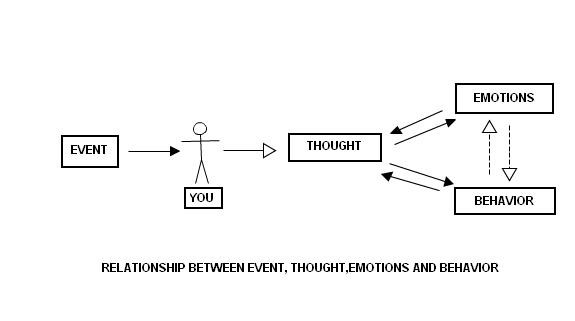
Sometimes, our thoughts can be inaccurate and unhelpful so you don't have to believe them. Here are some common unhelpful thinking habits we all make from time to time.
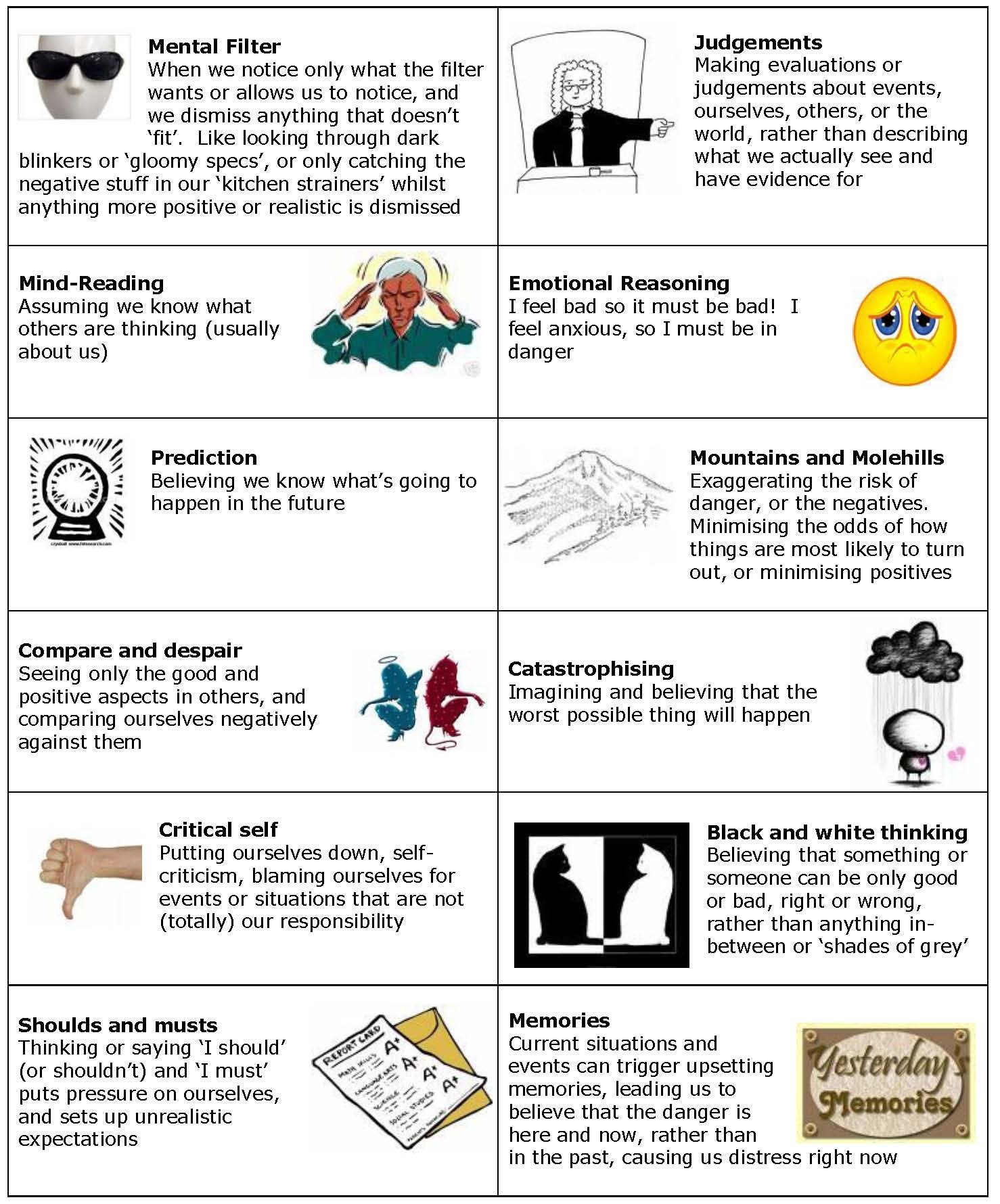
Now that you've identified your unhelpful thoughts, learn to replace them with alternative, more balanced thoughts. Here are some examples:
| Unhelpful Thoughts | Balanced, Alternative Thoughts |
|---|---|
| Critical - I am doing such a bad job and my loved one is angry with me. | I am doing my best. He/she must be having a hard time as well and does not mean it. |
| Compare & Despair - Why do other patients seem to be getting better and not my loved one? | Everybody has their good and bad days, treatment is not the same for everybody. |
| Shoulds & Musts - I should be available 24 hours a day and I must be able to help whenever he/she needs me. | Nobody can be available all the time; it is ok for me to take a rest. |
| Black & White Thinking - If he/she is not well, there is no way we can have a normal family life. | He/she may not be in the best of health, but we can still do things together as a family. |
| Catastrophising - Oh dear, he/she is having a cough, something must be wrong. I'd better send him/her to the hospital immediately. | It may not be anything serious. I'll not jump to conclusions and will investigate it calmly and properly. |
Through practicing these cognitive strategies, you can reduce the impact of negative and unhelpful thoughts on your behaviour and mood.
By looking at your thoughts rationally and calmly, you can then choose your actions in line with your values rather than letting unhelpful automatic thoughts control your life.
When our loved ones are ill, as caregivers, we have the natural tendency to want to make them feel better. We may go the extra mile to comfort them, bring them food that they like, or help them to carry out errands and tasks. Although we may have good intentions at heart, we may unknowingly overstretch ourselves by constantly putting others’ needs before ours.
Being a caregiver is an extremely stressful experience in itself, and we need to remember to take equally good care of ourselves in order to be in the best position to help our loved one. How do you know when you are under stress? Here are some symptoms you can spot for:
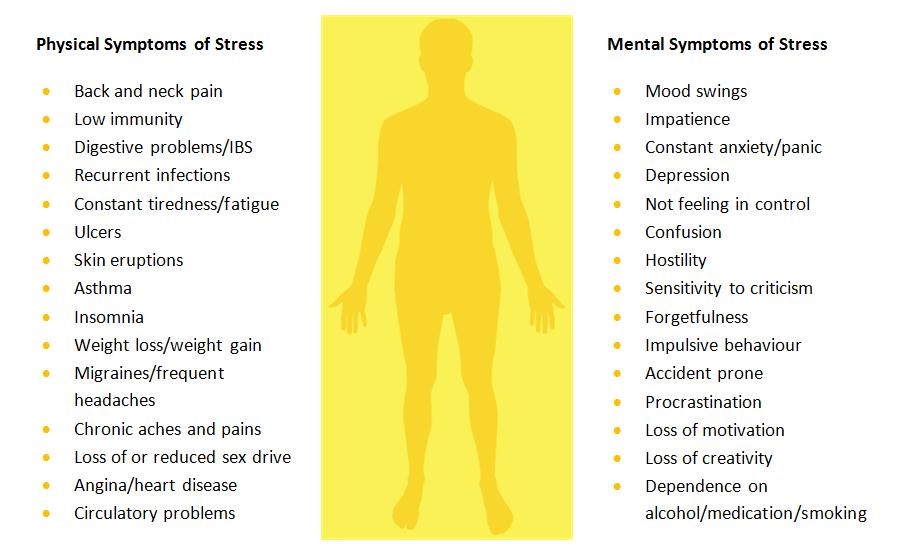
It is not selfish nor does it make you a poor caregiver if you take some time-off for yourself. The skill of "looking after ourselves" and paying attention to your needs is an important one. Here are some ideas to increase your self-care:
Other Stress Management Tips
Emotional Acceptance
Calm Breathing

Calm breathing (sometimes called deep diaphragmatic breathing) involves taking smooth, slow, and regular breaths. It is especially effective when you feel anxious, worried, or have physical symptoms of stress such as heart palpitations or sweaty palms.
Progressive Muscle Relaxation (PMR)
One of the body's reactions to fear and anxiety is muscle tension. Muscle relaxation can be particularly helpful in cases where anxiety is especially associated with muscle tension.
One method of reducing muscle tension that people have found helpful is through a technique called Progressive Muscle Relaxation (PMR). Through PMR exercises, you tense up particular muscles then relax them, and practice this technique consistently.
Steps to Prepare
*Kindly note that if you have any injuries or a history of physical problems that may cause muscle pain, always consult your doctor before practicing these exercises.
Things to Note
Step-by-step Guide
Practice means progress. Only through practice can you become more aware of your muscles, how they respond to tension and how you can relax them.
Cancer caregivers tend to experience strong emotions during the cancer journey with their loved ones. This can range from sadness, worry, fear, guilt, anger, and frustration. As a caregiver, what can you do to handle this emotional reactivity when it arises?
These are some tips to help you cope better.
Distraction helps you feel better by diverting your attention away from the distressing thoughts & feelings. It works even better if you choose something that will really grab your attention and keep you absorbed in that activity. Different things work for different people. Here are some ideas:
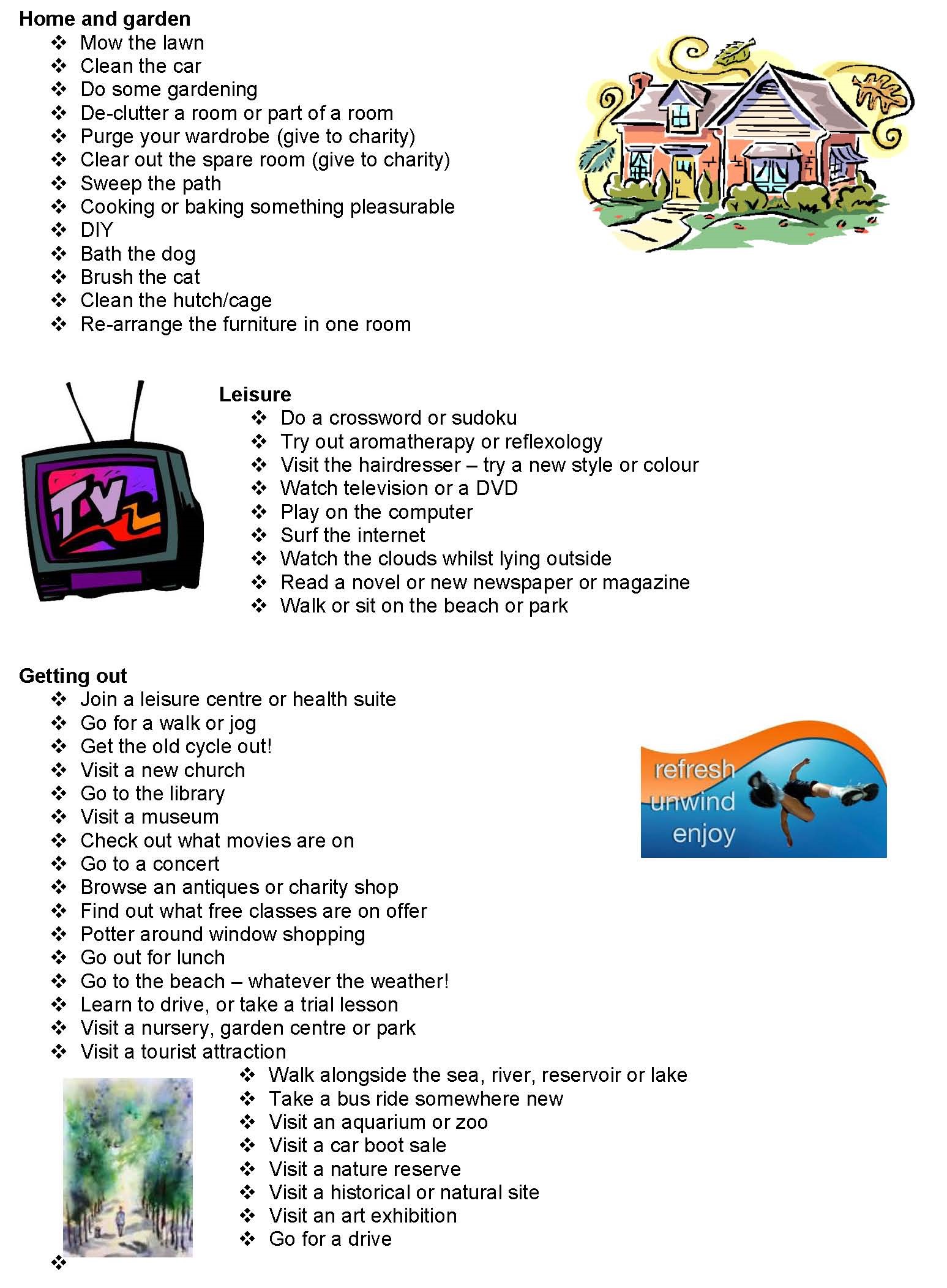
Self-soothing works when you are emotionally charged to provide yourself with comfort, nurturing and to be kind to yourself. One way to think of this is to soothe each of your five senses via the following methods below.
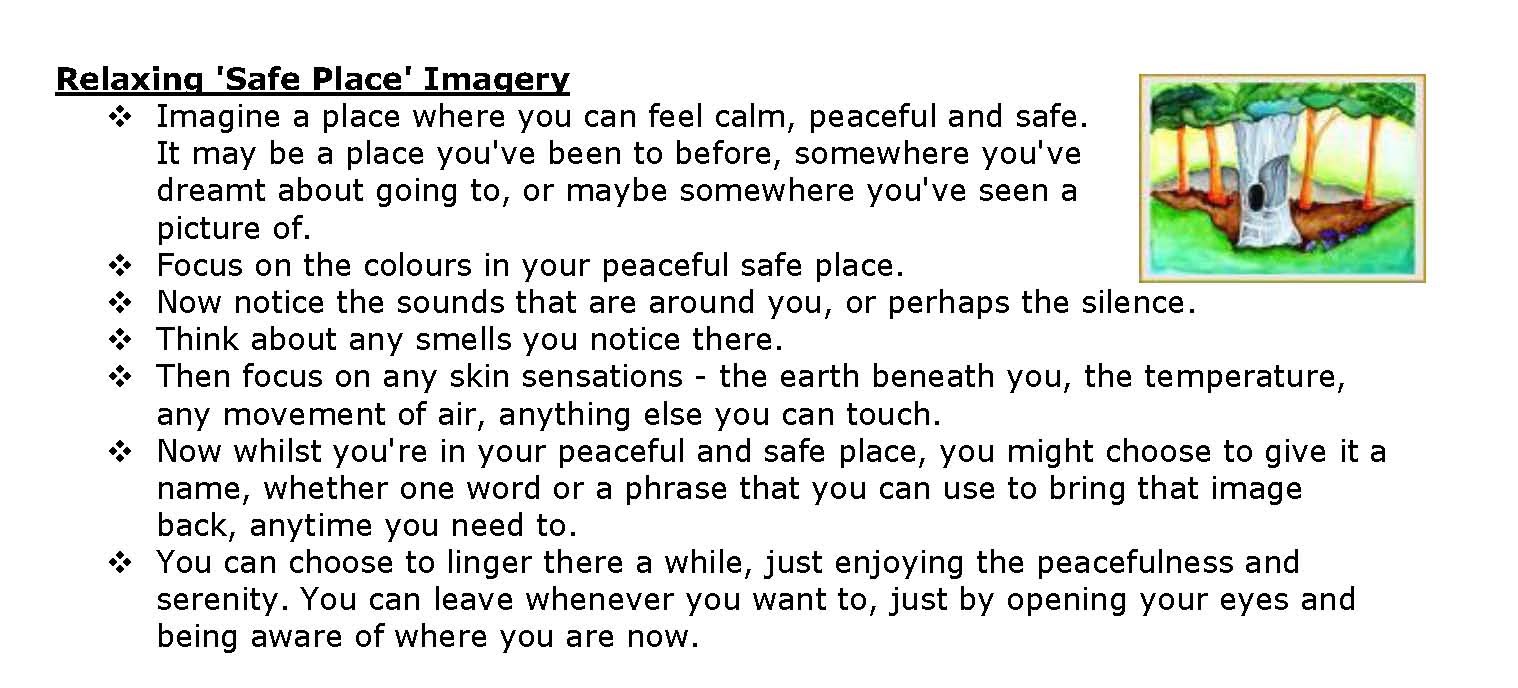
Taking care of a loved one with cancer may be overwhelming and sometimes, it may cause physical and mental exhaustion, sometimes even leading up to anxiety and depression that are not to be taken lightly. Read up on the signs of anxiety and depression so as to recognise the warning signs early and get tips on how to deal with them.
If you are going through anxiety and/or depression and need to speak to someone about it, do contact our CancerLine hotline, a free and anonymous counselling hotline operated by trained oncology nurses at +65 9722 0569 who will be able to assist you with your situation.
Anxiety
Anxiety is a common emotion that anyone can experience in their everyday lives. It occurs in response to perceived threats and can present as physical, emotional and behavioural reactions.
However, anxiety starts becoming a problem when it:
The term "Anxiety Disorders" includes Generalised Anxiety Disorder, Obsessive Compulsive Disorder, Phobias, Acute and Post-traumatic Stress Disorder. Although anxiety is a common feature and the different types of anxiety disorders have different symptoms, generally, all respond well to treatment.
How do I relieve anxiety?
These are some tips that may help:
Anxiety Management Tips
Practise Positive Self-Statements
Preparation
Coping
Praise / Review
Depression is a word used in everyday language to describe a number of feelings, including sadness, frustration, disappointment, and sometimes lethargy. However, the clinical definition differs from these everyday "down" periods in three main ways:
Depression can affect anybody at any stage of their life.
What are the symptoms?
What causes depression?
Depression is often caused by a combination of biological and psychological factors interacting with one another.
Biological Factors
Psychological Factors
Pharmacological (e.g. antidepressants) and psychological therapies are available and effective in treating depression.
Depression management tips
#1 Reversing the cycle of depression
Here are some possible fun things you can do:
Try some of them out and evaluate how you feel before and after the activity. Chances are, you will find that you feel a little better. The important thing is to persist.
#2 Understanding yourself
What really makes us feel and respond the way we do is not the situation or the words and actions of another person, but how we perceive the situation or that person's actions. It is our thoughts and beliefs about an event that significantly influence our feelings and actions. We may not be aware of our thoughts and beliefs as they are often automatic and happen quickly.
If you are feeling anxious, depressed or upset, it is very likely that you have been thinking negative thoughts. These are called unhelpful thoughts as they lead to unpleasant feelings or actions. All of us think about things that make us feel sad or anxious, and that is part and parcel of life. However, if you often feel distressed or upset, you may ned to examine your thoughts in order to improve how you feel.
What are unhelpful thoughts?
Unhelpful thoughts are thought patterns that have become a habit and contribute to a person's negative feelings. Thoughts that are considered unhelpful are:
Things you can do to make yourself feel better